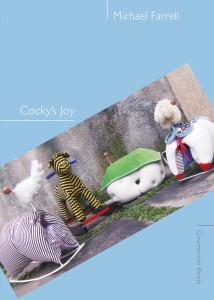Book Review
 Michael Farrell’s 2015 collection, Cocky’s Joy, is ambidextrous, its right hand painting comic tableaux, and its left rendering cool judgments. Farrell is often described as one of Australia’s leading experimental poets. “Experimental” in American work has recently tended toward the conceptual, polemical, and grotesque. Farrell’s experiment is one in bluff intelligence and sparkling, offhand wit.
Michael Farrell’s 2015 collection, Cocky’s Joy, is ambidextrous, its right hand painting comic tableaux, and its left rendering cool judgments. Farrell is often described as one of Australia’s leading experimental poets. “Experimental” in American work has recently tended toward the conceptual, polemical, and grotesque. Farrell’s experiment is one in bluff intelligence and sparkling, offhand wit.
The best poems of his collection eschew apolitical rumpus-room surrealism of the “and now this” variety in favor of waging a vigorous campaign to revise their American influences and to identify what Australian poetry, particularly its entrenched pastoral/Arcadian (i.e. white, settler, straight) tradition, leaves out. Here, he employs the looping long-form surrealism and elliptical shifts of a John Ashbery or Frank O’Hara a la “In Memory of My Feelings” in a specifically Australian topoi, as we see in “An Australian Comedy”:
…A timeless street is rezoned and crumbles
George is here from Singapore, wants to know where
the place to be is; if it’s Asian friendly. You are ageing
with your hands in your pouch, your strong tail a seesaw
….
The ferry came. They say they don’t know, yet make noises
at night, like possums swallowing loads of ants and throwing
them up again. A wicked waste. There in the bed, in the middle
yet somehow separate, lie Sartre and Beauvoir
The racist enclosures of Australian urban space (“if it’s Asian friendly”) rub against the sympathetic transformation of the reader into a kangaroo and also Farrell’s own literary rolodex (“Sartre and Beauvoir”). He’s not just piling up things but revealing and crossing boundaries while holding his multiple subjects in equipoise.
At a reading in Buffalo, I heard a friend of Farrell’s comment that Farrell was developing a “poetics of the pouch”: a marsupial poetics that identifies itself as Australian—not the state of Australia, but the ecologies of the place, what Farrell describes as its “queer flowers and roots.”
Perhaps the room is one type of pouch for Farrell. Take one of the book’s many eerie indoor tableaux in “The Great China Diggers”:
Charles and Emma played cribbage
in the corner, only the fine patina of cocaine
on Emma’s nostrils suggested cribbage wouldn’t
satisfy the next decade of afternoons
This is an eye intimate with its subject. The juxtaposition of cribbage and cocaine give the portrait a drowsy glamour. This poem, so much about a privileged ennui, comically and ruthlessly deflates it in an image worthy of David Lynch: “Caterers arrive, and pop / balloons of soup and hot chocolate over the / slack mouths of guests.” James Dickey imagined that there was a poet buried in everyone “like Ariel in his tree.” Farrell replies, “When someone’s going to kill you, love you, they like to know what’s inside you.” Here he’s rejecting the “deep” image of nested objects because to get at what’s hermetically sealed, we must vivisect the subject. Instead, the clause ‘love you’ creates a fold, a pouch, an intriguing complication in the forward movement of the sentence.
Farrell’s particular genius, and really the sense as a reader that you’re in the hands of a responsible thinker, is in springing between fearlessly unequivocal declarations and perfect images, as demonstrated in “The Comic Image”:
…Animals, juxtapositions: it’s basically
Surrealism without political (or psychological) intent
(in other words that typical mix of reaction and naiveté –
is naiveté – or naivety – kinder than ignorance, as a description?).
The mule leans back in its comfy chair made of pancakes,
Molasses dripping like blood from its jowls…
I cringe at lit-crit in poems but find myself both seduced by the comic-gothic final image and in agreement with his evaluation of poets’ thoughtless use of animals in poems.
If this review has been one of praising Farrell’s poems for their balance, it will end by turning to the collections’ more straightforward poems of queer desire. These may serve to correct an American audience’s perspective of Australia as a sort of southern hemisphere wild West, filtered as it most recently is through the hyper masculine big cars and flaming guitars of Mad Max. “Making Love (To A Man)” is smoldering and full of quick, surprising turns in and out of the intimacy. “Spoiled for Choice: 80 Ganymedes” is a light list poem that actually does its subjects justice: “Max his hair like a cypress”; “Jack on the stairs-a vision to behold!”; “Yoshi is always being chased by bees.”; “Ahmad has a hedge he prunes when topless, / Luigi’s a still-life with apple, fish.” Farrell is, as the subject demands, alternatively sympathetic and analytically cool, but there’s not much ambivalence in this poem, just hungry exuberance.
About the Reviewer
Joe Hall is the author of The Devotional Poems and Pigafetta is My Wife (Black Ocean). With Chad Hardy, he co-wrote The Container Store Vols I & II (SpringGun Press). He lives in Buffalo, where he is involved with the publishing concern Hostile Books and studies commons, waste-flows, and poetics.